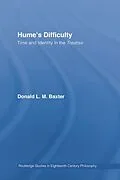In this volume--the first, focused study of Hume on time and identity--Baxter focuses on Hume's treatment of the concept of numerical identity, which is central to Hume's famous discussions of the external world and personal identity. Hume raises a long unappreciated, and still unresolved, difficulty with the concept of identity: how to represent something as "a medium betwixt unity and number." Superficial resemblance to Frege's famous puzzle has kept the difficulty in the shadows. Hume's way of addressing it makes sense only in the context of his unorthodox theory of time. Baxter shows the defensibility of that theory against past dismissive interpretations, especially of Hume's stance on infinite divisibility. Later the author shows how the difficulty underlies Hume's later worries about his theory of personal identity, in a new reading motivated by Hume's important appeals to consciousness. Baxter casts Hume throughout as an acute metaphysician, and reconciles this side of Hume with his overarching Pyrrhonian skepticism.
Autorentext
Donald L. M. Baxter is Professor of Philosophy at the University of Connecticut.
Inhalt
Introduction 1. Interpreting Hume as Metaphysician and Sceptic 2. Moments and Durations 3. Steadfast Objects 4. Identity 5. Representing Personal Identity 6. Hume' Difficulty about Identity
